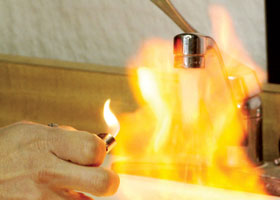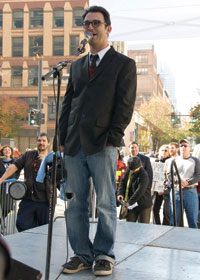Igniting Minds

Josh Fox’s widely seen and highly acclaimed documentary, Gasland, ran on HBO in 2010 and was shown at grassroots gatherings around the country. The movie was nominated for an Academy Award and this past September Fox was awarded an Emmy for outstanding directing. Below, Fox talks to E about his plans for a sequel and for ramping up the fight against fracking.
E Magazine: So, you’re working on a sequel, Gasland 2. Tell us about it.
Josh Fox: Gasland created such a wave of enthusiasm. It took me on the road for over a year. We had a grassroots engagement campaign where I did a 150-city tour, because I wanted to get out and talk to people. Millions saw it on HBO. It was phenomenal because it changed the game overnight, but I still wanted to go and re-contact all those communities that I visited. In the course of doing that, I re-interviewed all the people from the first movie, and found their stories were equally compelling going forward.

We’re still in deep shit in New York and Pennsylvania. The state of Pennsylvania is being systematically destroyed, and New York has just lifted the drilling moratorium. [Gov. Andrew] Cuomo is contemplating drilling. That is one focus of the continuing story. Another piece is, what kind of system could this happen inside of? So I went and tried to investigate in Washington, DC, and in Albany, and Harrisburg, and Austin, and there’s a focus on the second form of contamination and pollution, which is the money in the political system, which I believe is as great or greater than the contamination that’s happening in the ground.
E: How did you organize your tour?
J.F.: We worked hand in hand with a grassroots movement across America. You have a grassroots organization in every little town in New York state against fracking. What we said to them is, “We’ll screen the film or we’ll do the house party,” and they pull in all their folks. So we had a 2,000-seat opera house on a rainy Tuesday night in Williamsport, Pennsylvania, and 1,600 people came out. And that’s active engagement in living your life and participating in democracy; it’s not just seeing a movie, because then you have a panel and you have organizations there and they’re doing their canvassing and petitions and signing people up, and that’s the whole purpose, and it’s created a revolution. I’ve never seen a movement like this in my life. These people are not going home—they are home. The battlefield is in their front yards.
E: I don’t know how many people believe in the concept of “clean coal,” but the gas industry seems to have successfully promoted “clean natural gas.”

J.F.: The gas industry is trying to split itself off from the fossil fuel industry. They don’t want to be associated with coal; they don’t want to be associated with oil. But they are. They’re a fossil fuel and they’re directly competing with the renewable energy future that we all know we need. They’re trying to corner the next 50 years of our energy market in America, and that can’t happen. If that happens they’re going to be drilling a fifth of the United States and making it uninhabitable. This is going on in 34 states; the scale of it is immense. What they’re trying to do is put natural gas in cars [and use] natural gas as our electricity generation when we could be using the clean, renewable technologies that last forever, and don’t run out, and that are not controlled by oil barons turned into gas barons.
E: It still seems like those who’d like to have less U.S. dependence on foreign oil or those who oppose coal—and especially mountaintop removal mining—could promote gas as a better choice.
J.F.: No, I was at Blair Mountain [an anti-mountaintop removal rally in June] and I met with the leadership of the movement and they said, “Thank God you’re here, because if the coal’s not going to get us, the gas is gonna get us.” Because that whole area is over the frack zone—every piece of West Virginia—and I was there specifically for that purpose, because others are saying, “Let’s just get rid of coal and we can frack the world and get the gas instead.” This is like out of the frying pan into the fire.
All these myths about how gas is better than coal are just that—they are an industry PR campaign. The coal activists are overwhelmingly in support of the message I brought there. It is the same fight. The people of West Virginia have been expendable for a very long time. What’s happening now is you’re seeing more and more places being considered expendable, and more and more people being considered expendable.
E: The initial U.S. Environmental Protection Agency study looking at fracking’s impact on drinking water is due out next year. A lot of groups concerned about fracking think the focus is too narrow. What do you think?
J.F.: The focus is way too narrow, but it’s what we’ve got going on now so we have to support it. I had a sit-down interview with [EPA Administrator] Lisa Jackson for Gasland 2 about a month ago. I said, “EPA’s stated policy is to come in and enforce where the state’s enforcement is inadequate. I can give you dozens of examples of where that’s not happening. Will you work with us directly so we can bring you these cases you may not be aware of and develop a system to do that?” And she said ‘yes,’ so we’re now in a partnership, and we have to hold them to that
The EPA has not been blameless in this. In 2004, the EPA study on groundwater fracking showed that the contamination was there, showed that the material was toxic, and then the conclusion somehow was that it wasn’t a risk. This is insane. It’s an Orwellian conclusion that makes no sense. Lo and behold, five of the seven members of the peer review panel were working for the gas industry—they had direct financial conflicts of interest.
E: If it’s true that fracking is actually worse for the planet in terms of greenhouse gases, do you think some of the established environmentalists and academics who have been saying that natural gas is a “bridge fuel” will change their minds?
J.F.: Those positions are changing. The Big Greens are realizing there’s a disconnect between their positions on natural gas and what’s happening on the ground, and they have to address it. They’re fighting coal, and that’s good, but the answer is, what are you going to point to [instead]? And the answer can’t be, “We’re gonna frack America.” The difference is that nobody really understood what horizontal slick water hydrofracking really was until recently. This is a new development. In the old way of getting natural gas, you just tap a natural gas pocket and it comes out. You don’t have to use millions of gallons of water and thousands of gallons of toxic chemicals per well. You don’t have this incredibly high pressure which is destroying this underground geology
I think through the film Gasland and through what the citizens are saying across America, I think they’re starting to understand how dire the situation is.

